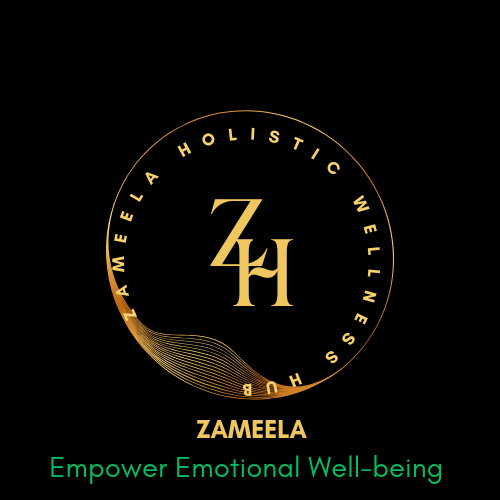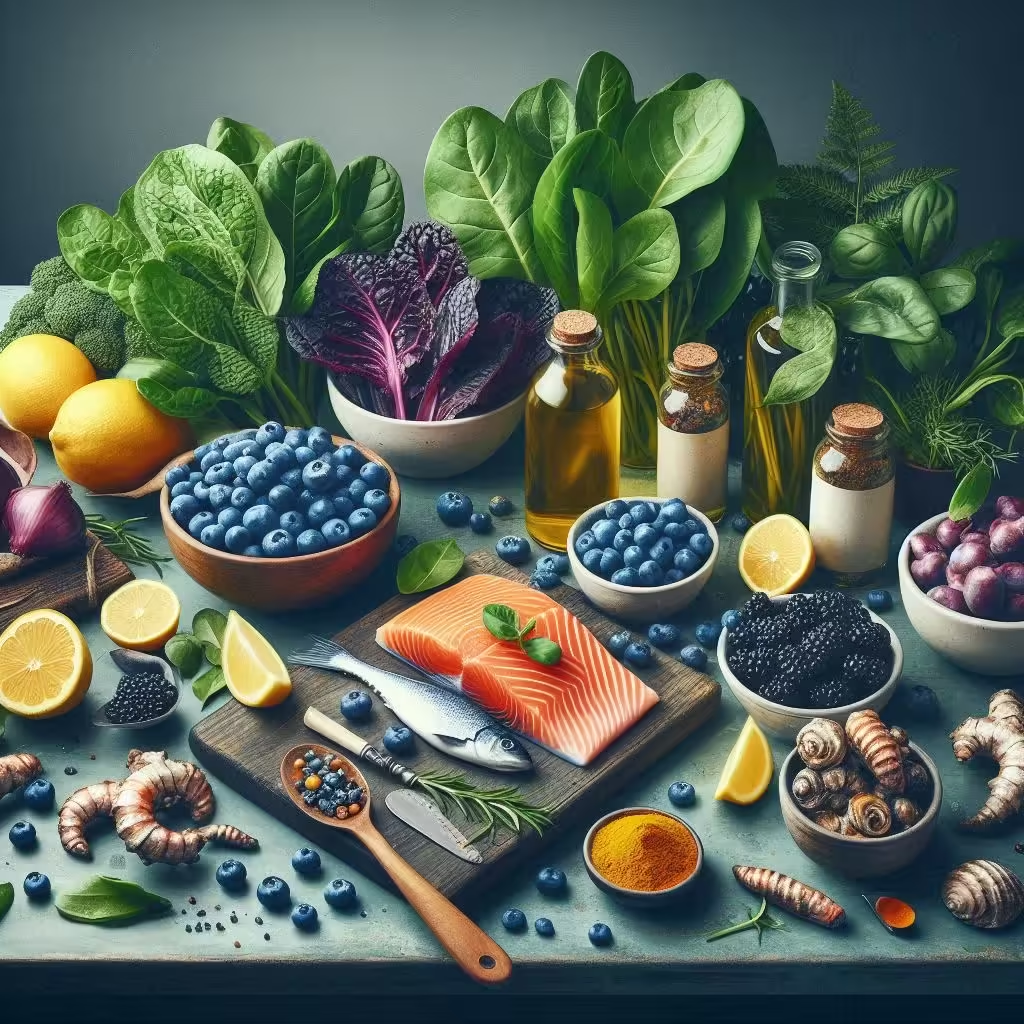Antidepressant Foods to Improve Mental Well-being: 5+ Powerful Choices for a Mood Boost
Feeling Down? Discover 5+ Antidepressant Foods for a Happier You!
Antidepressant Foods to Improve Mental Well-being: 5+ Powerful Choices for a Mood Boost
Nourish Your Way to Happiness: Discover Antidepressant Foods
Key Takeaways:
- Certain foods are rich in nutrients that can support brain health and mood regulation, like omega-3 fatty acids, folate, zinc, and antioxidants.
- Incorporating these foods into your diet can be a natural way to improve your mood and combat symptoms of depression and anxiety.
- A healthy gut microbiome is essential for mental well-being, and some foods can help nourish these gut microbes.
Introduction:
The Gut-Brain Connection: How Food Affects Your Mood
Ever feel sluggish after a heavy meal or energized after a healthy salad? It’s not just your imagination! There’s a growing body of research exploring the powerful connection between what we eat and how we feel.
Our gut, often referred to as the “second brain,” is teeming with good and bad bacteria that influence the production of neurotransmitters, the chemical messengers in our brains that regulate mood, sleep, and stress.
By nourishing our bodies with the right foods, we can support these gut microbes and promote the production of feel-good chemicals like serotonin and dopamine, leading to a brighter outlook and improved mental well-being.
Antidepressant Foods to Improve Mental Well-being: 5+ Powerful Choices for a Mood Boost
1. Blueberries: Tiny Powerhouses for a Brighter Mood
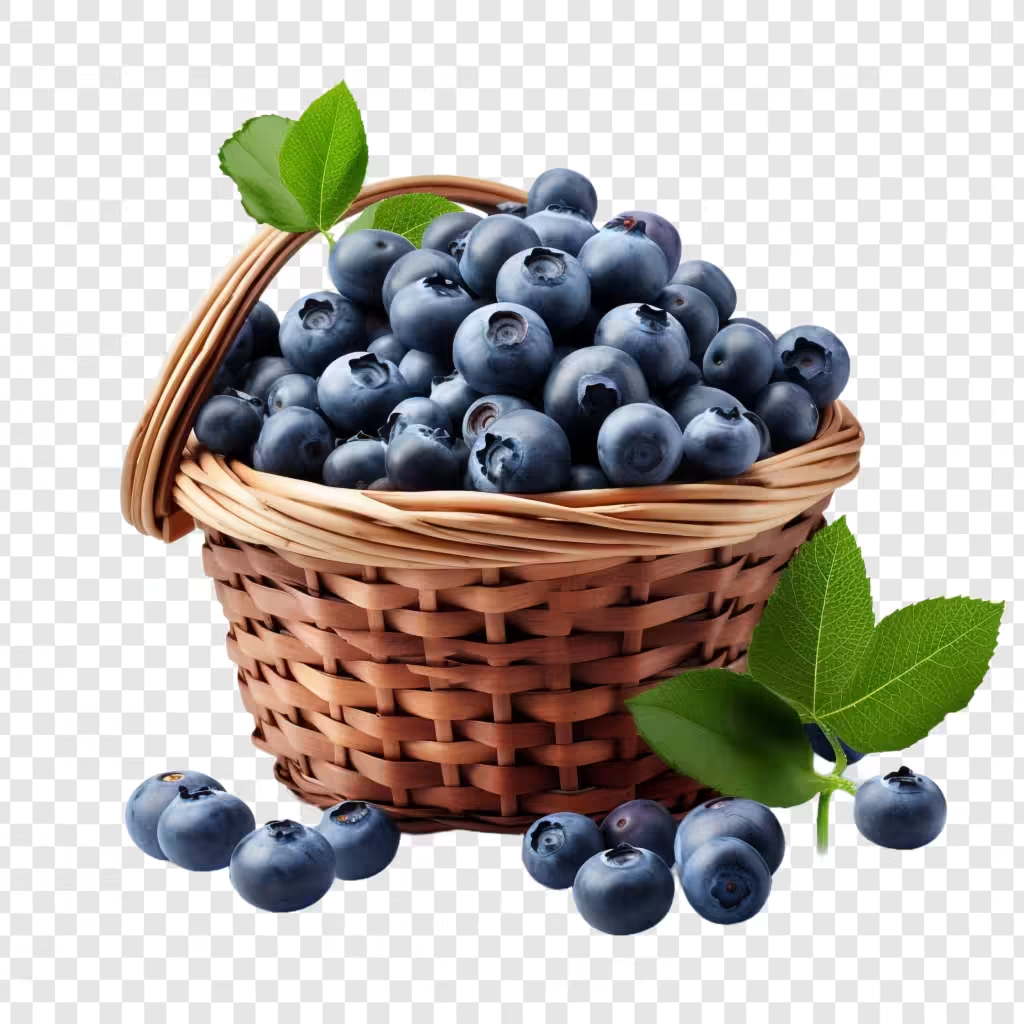
Don’t let their size fool you! Blueberries are bursting with antioxidants and other mood-boosting nutrients that can make a big difference in your mental well-being. Here’s why these little berries deserve a spot in your diet:
- Antioxidant Powerhouse: Blueberries are rich in anthocyanins, a type of antioxidant that helps fight inflammation throughout the body, including the brain. Inflammation has been linked to depression and other mood disorders.
- Folate for Focus: Blueberries are a good source of folate, a B vitamin that plays a crucial role in brain function and the production of neurotransmitters like serotonin. Serotonin helps regulate mood, sleep, and appetite.
- Natural Sweetness: Unlike sugary treats that can cause a temporary mood spike followed by a crash, blueberries offer natural sweetness without the blood sugar roller coaster.
So next time you’re looking for a mood-boosting snack, reach for a handful of blueberries!
Antidepressant Foods to Improve Mental Well-being: How can I incorporate blueberries into my daily snacks
Here are some creative ways to incorporate blueberries into your daily snacks:
Blueberry Smoothie Popsicles
- Blend together blueberries, Greek yogurt, honey, and a splash of milk
- Pour the mixture into popsicle molds and freeze for a refreshing, mood-boosting treat
Blueberry Chia Pudding
- Mix together chia seeds, almond milk, maple syrup, and a handful of blueberries
- Refrigerate overnight for a delicious, nutrient-dense pudding
Blueberry Almond Butter Toast
- Spread almond butter on whole grain toast and top with fresh blueberries
- Drizzle with a bit of honey for extra sweetness
Blueberry Spinach Salad
- Build a salad with a base of spinach, topped with blueberries, sliced almonds, and a light vinaigrette
- The combination of blueberries and leafy greens provides a powerful antioxidant and mood-boosting punch
Blueberry Yogurt Parfait
- Layer plain Greek yogurt, fresh blueberries, and a sprinkle of granola in a jar or glass
- Refrigerate until ready to enjoy for a quick and easy snack
The key is to get creative and find ways to incorporate blueberries into your regular snacking routine. Their natural sweetness and antioxidant properties make them a delicious and nutritious choice for supporting mental well-being throughout the day.
Antidepressant Foods to Improve Mental Well-being: 5+ Powerful Choices for a Mood Boost
2. Salmon: Omega-3s for a Happier Brain: How omega-3 fatty acids fight depression
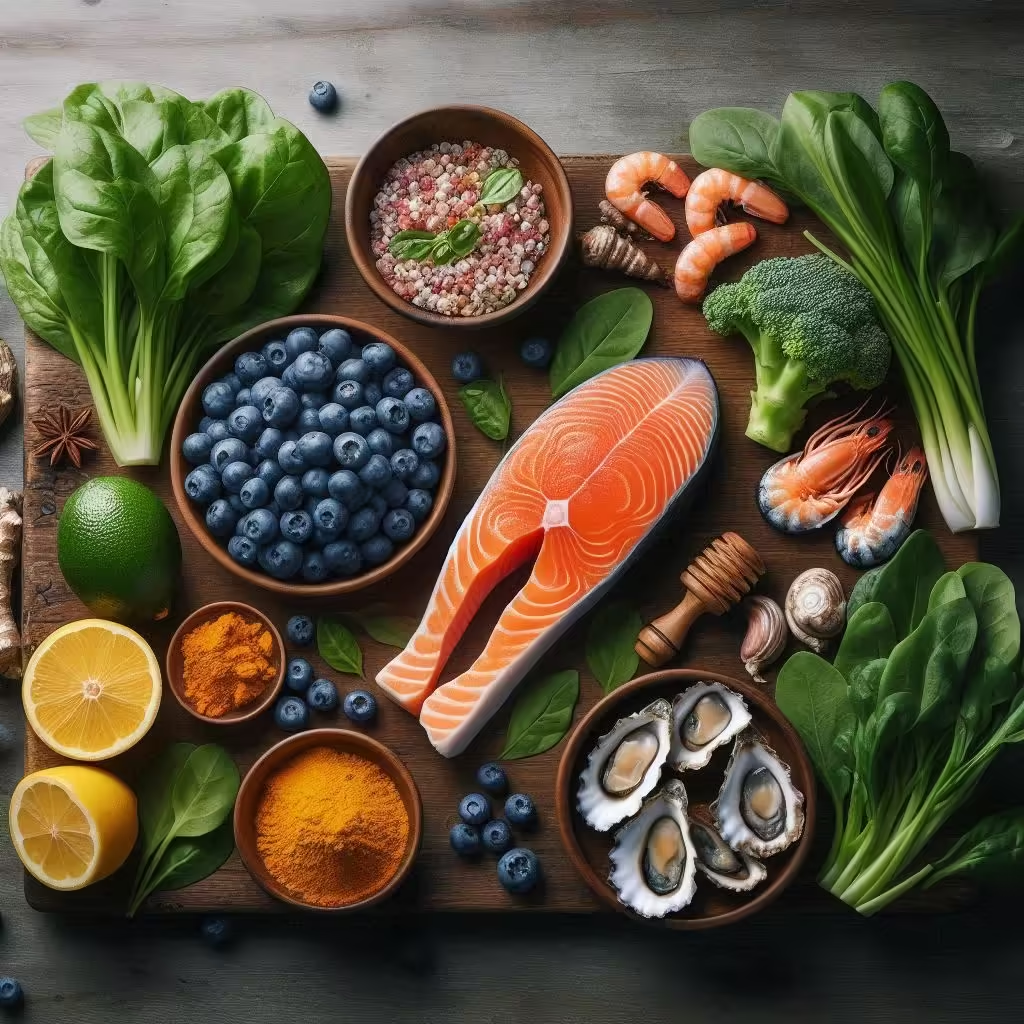
Feeling a bit down? Salmon might be the answer! This delicious fish is a fantastic source of omega-3 fatty acids, particularly EPA and DHA. These essential fats play a crucial role in brain health and have been linked to improved mood and reduced symptoms of depression. Here’s how omega-3s in salmon can support your mental well-being:
- Brain Builders: Omega-3s are like building blocks for the brain. They help maintain healthy cell membranes and support the function of neurotransmitters like serotonin and dopamine, which regulate mood, sleep, and motivation.
- Fighting Inflammation: Omega-3s possess anti-inflammatory properties. Chronic inflammation has been linked to depression, and research suggests that omega-3s may help combat it, leading to a more positive outlook.
- Dietary Delight: Unlike some supplements, omega-3s from salmon are readily absorbed by the body. Plus, enjoying a delicious salmon dish is a much more enjoyable way to get your daily dose of these mood-boosting nutrients.
So, the next time you’re planning your meals, consider adding some salmon to your menu. It’s a tasty and effective way to support your mental well-being and swim towards a happier you!
Antidepressant Foods to Improve Mental Well-being: How can I incorporate Salmon into my daily meals
Here are some creative ways to incorporate salmon into your daily meals:
Breakfast Boost
- Start your day with a salmon breakfast burrito – scramble eggs with smoked salmon, spinach, and a sprinkle of dill
- Top your avocado toast with a few slices of fresh salmon and a squeeze of lemon
- Blend salmon, Greek yogurt, berries, and chia seeds into a nutrient-dense smoothie
Lunchtime Lift
- Build a hearty salmon salad with mixed greens, roasted veggies, and a tangy vinaigrette
- Stuff salmon into whole grain pita pockets with cucumber, tomato, and a creamy dill sauce
- Wrap up salmon, brown rice, and sautéed broccoli in a whole wheat tortilla
Dinner Delight
- Bake salmon fillets and serve over a bed of roasted sweet potatoes and Brussels sprouts
- Grill salmon steaks and pair with a side of quinoa and sautéed spinach
- Make salmon cakes or patties and serve over a bed of mixed greens
Snack Smart
- Enjoy salmon jerky or smoked salmon slices as a protein-packed snack
- Top whole grain crackers with cream cheese and a slice of fresh salmon
- Blend salmon, avocado, and lemon juice into a nutritious dip for veggies
The key is to get creative and find ways to incorporate salmon into your meals throughout the day. Its versatility allows you to enjoy it for breakfast, lunch, dinner, and even snacks. Experiment with different cooking methods, flavor profiles, and ingredient pairings to keep your salmon dishes exciting and delicious.
Antidepressant Foods to Improve Mental Well-being: 5+ Powerful Choices for a Mood Boost
3. Leafy Greens: Folate and Fiber for Emotional Balance
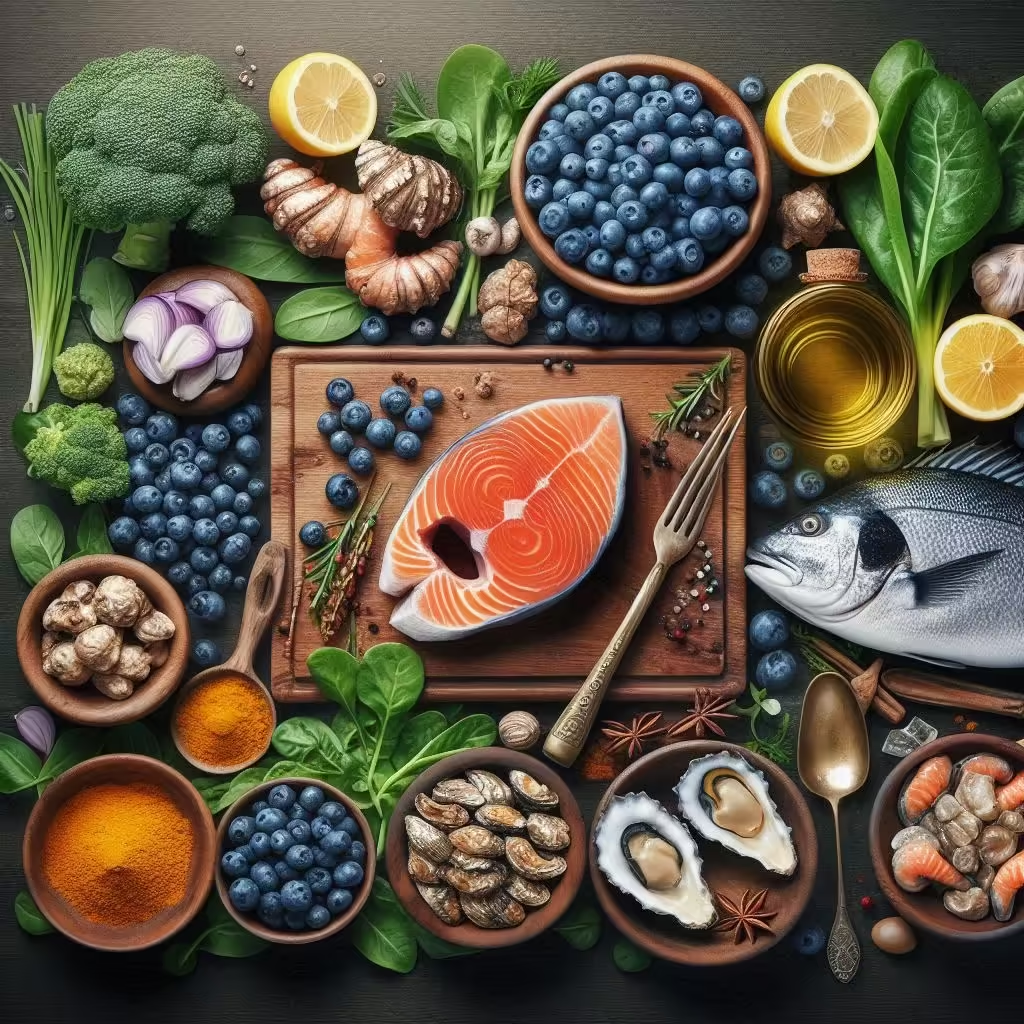
Leafy Greens: Don’t underestimate the power of your greens!
Leafy greens like spinach, kale, and Swiss chard might not seem like the most exciting foods, but they pack a powerful punch when it comes to supporting mental well-being. Here’s why these vibrant veggies deserve a starring role on your plate:
- Folate Power: Leafy greens are a rich source of folate, a B vitamin essential for healthy brain function. Folate plays a crucial role in the production of neurotransmitters like serotonin and dopamine, which regulate mood, sleep, and stress levels.
- Fiber Fantastic: Leafy greens are also a great source of dietary fiber. Fiber helps keep your gut healthy, and a healthy gut microbiome is linked to improved mood and reduced symptoms of anxiety and depression.
- Brain-Boosting Blend: Leafy greens are loaded with other beneficial nutrients like vitamin K, magnesium, and antioxidants. These work together to support brain health and protect against cognitive decline.
So, ditch the misconception that greens are boring! Experiment with different leafy greens in salads, smoothies, or even stir-fries. Your taste buds and your mood will thank you!
Antidepressant Foods to Improve Mental Well-being: How can I incorporate Leafy Greens into my daily Meals
Here are some creative ways to incorporate more leafy greens into your daily meals:
Breakfast Boost
- Sauté spinach or kale with your eggs for a nutrient-packed breakfast
- Blend leafy greens like spinach or Swiss chard into your morning smoothie
- Top your avocado toast with a handful of baby arugula or microgreens
Lunchtime Lift
- Build a hearty salad with a base of mixed greens, grilled chicken, and roasted veggies
- Wrap up sautéed kale, quinoa, and roasted sweet potato in a whole wheat tortilla
- Add shredded kale or spinach to your lunchtime soup or chili
Dinner Delight
- Sauté garlic and onions, then toss in chopped chard or collard greens as a side dish
- Bake salmon fillets on a bed of lemon-garlic roasted broccoli and spinach
- Stir-fry chicken or tofu with broccoli, bell peppers, and baby bok choy over brown rice
Snack Smart
- Dip crunchy veggie sticks like celery and carrots into a creamy spinach artichoke dip
- Blend up a green smoothie with kale, banana, almond milk, and a touch of honey
- Enjoy a handful of kale chips or a small salad as a between-meal snack
The key is to get creative and find ways to seamlessly incorporate leafy greens into your regular meals and snacks. Start small by adding a handful of spinach to your eggs or blending some kale into your smoothie. Over time, you can experiment with new recipes and flavor combinations to make leafy greens a delicious and nutritious part of your daily diet.
Antidepressant Foods to Improve Mental Well-being: 5+ Powerful Choices for a Mood Boost
4. Turmeric: The Anti-Inflammatory Mood Booster: Curcumin’s antidepressant and neuroprotective effects
Turmeric: The Golden Spice for a Sunny Disposition
Turmeric, the vibrant yellow spice known for its distinctive flavor, is also gaining recognition for its potential mood-boosting properties. This ancient culinary staple contains a powerful compound called curcumin, which boasts several benefits for mental well-being:
-
Anti-inflammatory Powerhouse: Chronic inflammation has been linked to depression. Curcumin possesses potent anti-inflammatory properties that may help combat inflammation and improve mood.
-
Neuroprotective Effects: Studies suggest curcumin may have neuroprotective qualities, potentially helping to protect brain cells and supporting cognitive function.
-
Mood-Boosting Potential: Curcumin’s ability to influence neurotransmitters like serotonin and dopamine is being investigated. These neurotransmitters play a key role in regulating mood, and some research suggests curcumin may support their production, leading to a more positive outlook.
Important Note: While research on curcumin’s antidepressant effects is promising, it’s important to consult with your doctor before using it as a treatment for depression. Additionally, curcumin can have interactions with certain medications.
However, incorporating turmeric into your diet as part of a healthy lifestyle can be a delicious way to explore its potential mood-boosting benefits. Try adding turmeric to curries, stir-fries, or even smoothies!
Antidepressant Foods to Improve Mental Well-being: How can I incorporate Turmeric into my daily Meals
Here are some creative ways to incorporate turmeric into your daily meals:
Breakfast Boost
- Add a pinch of turmeric to your scrambled eggs or omelet for a vibrant color and anti-inflammatory boost
- Blend turmeric, ginger, cinnamon, and black pepper into your morning smoothie
- Sprinkle turmeric on top of avocado toast for a flavorful twist
Lunchtime Lift
- Make a turmeric-ginger salad dressing to drizzle over your leafy green salad
- Add turmeric to your lentil or chickpea soup for extra flavor and anti-inflammatory benefits
- Stir-fry chicken or tofu with turmeric, cumin, and paprika for a delicious curry-inspired dish
Dinner Delight
- Roast vegetables like cauliflower, potatoes, or Brussels sprouts with turmeric, olive oil, and spices
- Make a turmeric-infused rice dish by sautéing onions and garlic in turmeric-infused oil before adding the rice
- Bake salmon fillets with a turmeric-lemon-garlic marinade for a flavorful and healthy meal
Snack Smart
- Mix turmeric into plain Greek yogurt for a savory snack, or add honey for a touch of sweetness
- Sprinkle turmeric on roasted chickpeas or nuts for a crunchy, anti-inflammatory snack
- Make turmeric tea by steeping turmeric, ginger, and lemon in hot water
The key is to get creative and find ways to incorporate turmeric into your regular meals and snacks. Start with small amounts and gradually increase as you become accustomed to the flavor. Combining turmeric with black pepper can enhance its bioavailability and potential health benefits.Remember, incorporating turmeric into your diet as part of a healthy lifestyle can be a delicious way to explore its potential mood-boosting benefits. Try adding turmeric to curries, stir-fries, or even smoothies!
Antidepressant Foods to Improve Mental Well-being: 5+ Powerful Choices for a Mood Boost
5. Oysters: Zinc-Rich Bivalves for Mental Resilience: Zinc’s importance for mood and cognitive function

Oysters: Dive into Mental Well-being with Zinc-Rich Bivalves
Oysters may not be everyone’s cup of tea (or should we say, oyster shell?), but these intriguing shellfish pack a surprising punch when it comes to mental well-being. Oysters are champions of zinc, a mineral that plays a crucial role in brain health and mood regulation. Here’s why these little ocean gems deserve a spot on your plate:
-
Zinc Powerhouse: Oysters are considered one of the richest dietary sources of zinc. Zinc is essential for the production of neurotransmitters like serotonin, which helps regulate mood, sleep, and appetite. Deficiencies in zinc have been linked to symptoms of depression and anxiety.
-
Cognitive Champion: Zinc also plays a role in cognitive function and memory. Studies suggest that adequate zinc levels can support memory, learning, and concentration.
-
Brain Booster: Zinc contributes to the health of brain cells and may help protect them from damage. This can be especially beneficial for maintaining cognitive function as we age.
A Note on Portion Size: While oysters are a fantastic source of zinc, it’s important to be mindful of portion sizes. Consuming excessive amounts of zinc can have negative health effects. Aim for a moderate serving of oysters or consult with your doctor about your individual zinc needs.
So, the next time you’re looking for a unique and potentially mood-boosting food experience, consider giving oysters a try! They might just become your new favorite bivalve brain booster.
Antidepressant Foods to Improve Mental Well-being: How can I incorporate Oysters into my daily Meals
Here are some creative ways to incorporate oysters into your daily meals:
Breakfast Boost
- Start your day with an oyster omelet – sauté shucked oysters with eggs, spinach, and a sprinkle of zinc-rich parmesan cheese
- Top your avocado toast with a few sliced raw oysters and a squeeze of lemon
- Blend oysters, Greek yogurt, spinach, and banana into a nutrient-dense smoothie
Lunchtime Lift
- Build a hearty oyster po’ boy with fried oysters, shredded lettuce, tomato, and a creamy remoulade sauce on a crusty roll
- Toss shucked oysters into a spinach salad with sliced apples, walnuts, and a zingy vinaigrette
- Wrap up sautéed oysters, quinoa, and roasted sweet potato in a whole wheat tortilla
Dinner Delight
- Bake oysters Rockefeller with a topping of spinach, breadcrumbs, and parmesan
- Grill oysters on the half shell with a drizzle of garlic-herb butter
- Make oyster chowder with potatoes, corn, and a creamy broth
Snack Smart
- Enjoy a few shucked oysters on the half shell with a squeeze of lemon and a dash of hot sauce
- Top whole grain crackers with cream cheese and a slice of fresh oyster
- Blend oysters, avocado, and lemon juice into a nutritious dip for veggies
The key is to get creative and find ways to incorporate oysters into your meals throughout the day. Their versatility allows you to enjoy them for breakfast, lunch, dinner, and even snacks. Experiment with different cooking methods, flavor profiles, and ingredient pairings to keep your oyster dishes exciting and delicious.Remember, oysters are a rich source of zinc, which is essential for mood regulation and cognitive function. Incorporating them into your diet can be a tasty way to support your mental well-being.
Antidepressant Foods to Improve Mental Well-being: 5+ Powerful Choices for a Mood Boost
Incorporating Antidepressant Foods into Your Diet: Tips for meal planning and recipe ideas
Power Up Your Plate: Tips for Adding Antidepressant Foods to Your Diet
Feeling overwhelmed by all these amazing mood-boosting foods? Don’t worry! Here are some practical tips to easily incorporate them into your meals and create a delicious path to improved well-being:
- Think Rainbow: Aim for a variety of colorful fruits and vegetables on your plate. Each color represents a different set of vitamins, minerals, and antioxidants that contribute to overall health and mood.
- Start Small: Don’t try to overhaul your entire diet overnight. Begin by adding one or two new antidepressant foods to your weekly menu. Gradually introduce more as you become familiar with them.
- Snack Smart: Ditch the sugary treats and processed snacks. Instead, reach for mood-boosting options like berries with nuts, yogurt with leafy greens, or a handful of salmon with avocado slices.
- Plan and Prep: Planning your meals and prepping ingredients in advance can save you time and prevent unhealthy choices when you’re feeling rushed.
- Get Creative: Don’t be afraid to experiment! There are endless ways to incorporate these mood-boosting ingredients into delicious dishes. Explore new recipes online or get creative in the kitchen.
Recipe Ideas for Mood-Boosting Meals:
- Breakfast for Brilliance: Start your day with a brain-boosting smoothie packed with spinach, banana, and a sprinkle of turmeric.
- Lunchtime Lift: Enjoy a colorful salad filled with leafy greens, grilled salmon, and a drizzle of olive oil dressing.
- Dinner Delight: Whip up a satisfying stir-fry with tofu, colorful vegetables, and a generous helping of brown rice.
Combining for Maximum Benefit:
The true magic lies in combining these antidepressant foods! Here are some ideas to maximize their mood-boosting potential:
- Omega-3 Power: Pair salmon with a side of leafy greens for a double dose of brain-healthy fats and folate.
- Fiber & Friends: Add some berries to your morning yogurt to combine the mood-regulating benefits of berries with the gut-friendly power of yogurt.
- Zinc & Spice: Experiment with adding a pinch of turmeric to your oyster dishes for a combination of zinc and potential anti-inflammatory benefits.
Remember, a healthy diet is just one piece of the puzzle for good mental well-being. Consider incorporating stress-management techniques, regular exercise, and adequate sleep for a holistic approach to improving your mood and overall mental health.
Some creative ways to incorporate Antidepressant Foods to Improve Mental Well-being
Here are some creative ways to incorporate antidepressant foods into your diet to boost mental well-being:
Breakfast Boost
- Start your day with a mood-enhancing smoothie – blend together spinach, blueberries, banana, and a sprinkle of turmeric.
- Top your oatmeal with sliced almonds, fresh berries, and a drizzle of honey
- Scramble eggs with sautéed leafy greens like kale or spinach.
Lunchtime Lift
- Build a salad with a base of mixed greens, grilled salmon, avocado, and a lemon vinaigrette.
- Wrap up roasted sweet potato, black beans, and sautéed mushrooms in a whole wheat tortilla
- Pack a bento box with edamame, sliced cucumbers, and a hard-boiled egg
Dinner Delight
- Stir-fry chicken or tofu with broccoli, bell peppers, and a turmeric-ginger sauce over brown rice.
- Bake salmon fillets and serve with roasted Brussels sprouts and quinoa
- Make a hearty vegetable soup loaded with leafy greens, beans, and diced tomatoes.
Snack Smart
- Dip apple slices or celery sticks in almond butter
- Enjoy a handful of mixed nuts like walnuts and almonds
- Blend up a smoothie with Greek yogurt, frozen blueberries, and a spoonful of ground flaxseed.
The key is to get creative and find ways to incorporate these mood-boosting ingredients into your regular meals and snacks. Experiment with new recipes, flavor combinations, and cooking methods to make these antidepressant foods delicious and enjoyable.
Antidepressant Foods to Improve Mental Well-being: 5+ Powerful Choices for a Mood Boost
Nourishing Your Mind and Body: The Final Bite
We’ve explored the fascinating connection between food and mood and discovered a treasure trove of “antidepressant foods” waiting to be incorporated into your diet. Here’s a quick recap of the power these foods hold:
- Brain Builders: Foods rich in omega-3s, folate, and other key nutrients provide essential building blocks for a healthy brain and support the production of neurotransmitters that regulate mood, sleep, and stress.
- Gut-Brain Connection: A healthy gut microbiome plays a crucial role in mental well-being. Antidepressant foods can help nourish these gut microbes, promoting a positive influence on mood and overall mental health.
- Natural Mood Boosters: From antioxidant-rich berries to zinc-packed oysters, these foods offer natural ways to support your mood without relying on medication.
Final Thoughts on Food and Mental Health:
While diet is a powerful tool for supporting mental well-being, it’s important to remember that it’s not a magic bullet. For optimal mental health, consider a holistic approach that incorporates healthy eating habits with stress-management techniques, regular exercise, and adequate sleep.
If you’re struggling with symptoms of depression or anxiety, consult with a mental health professional. They can provide guidance and support to develop a personalized plan for managing your mental well-being.
Remember, you are not alone. By nourishing your body and mind, you can take control of your mental health and pave the way for a brighter, happier you!
Take Action for a Happier You!
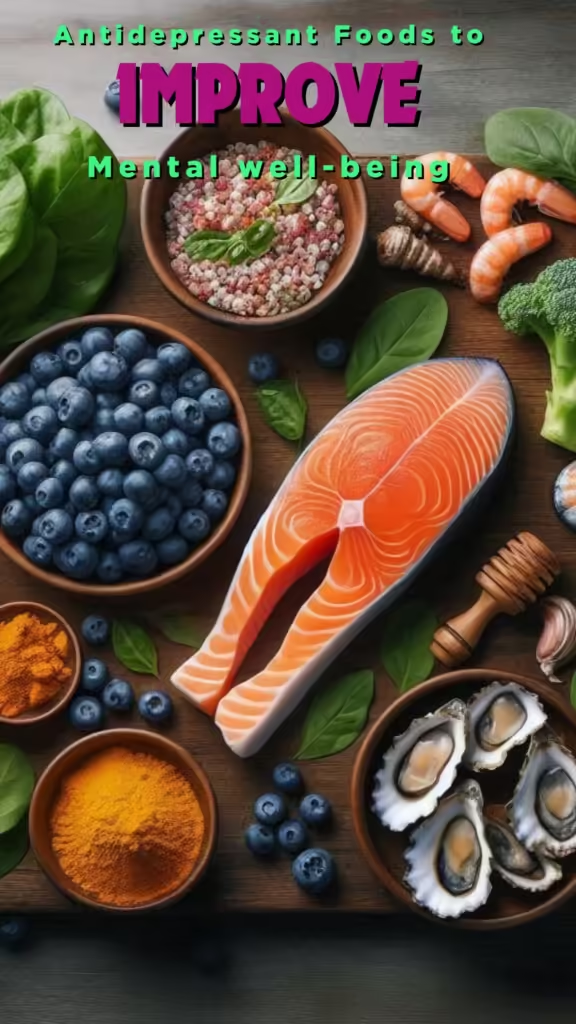
Ready to nourish your way to a brighter mood? We hope this article has empowered you to explore the world of antidepressant foods! Here’s how you can take action:
- Share the Knowledge: Spread the word! Share this article with your friends and family who might benefit from learning about the link between food and mental well-being.
- Leave a Comment: Do you have a favorite mood-boosting food? Share your tips and recipes in the comments below! We love hearing from our readers.
- Explore More: We’re passionate about mental health and healthy living. Stay tuned for more informative articles on our website!
By working together, we can create a community that supports mental well-being through healthy habits and delicious food choices. Let’s get started!
Antidepressant Foods to Improve Mental Well-being: Beyond Nutrition: The Power of Food for Your Mind
| Food Group | Examples | Key Nutrients | Benefits for Mental Well-being |
| Fatty Fish | Salmon, sardines, mackerel | Omega-3 fatty acids (EPA & DHA), Vitamin D | Reduces inflammation, supports brain function, improves mood |
| Leafy Greens | Spinach, kale, swiss chard | Folate, Vitamin B6, Magnesium | Supports neurotransmitter production, regulates mood, reduces anxiety |
| Whole Grains | Brown rice, quinoa, oats | Complex carbohydrates, B vitamins | Provides sustained energy, improves gut health, supports nervous system function |
| Nuts & Seeds | Almonds, walnuts, flaxseeds | Omega-3 fatty acids, Magnesium, Zinc | Improves cognitive function, reduces stress hormones, elevates mood |
| Fruits | Berries, citrus fruits | Vitamin C, antioxidants | Reduces inflammation, protects brain cells, improves mood |
Potential Risks and Side Effects:
- Fatty Fish: While generally safe, consuming large amounts of certain fish high in mercury (e.g., king mackerel, swordfish) can be harmful. Limit intake according to recommendations.
- Leafy Greens: Raw or improperly washed greens may carry a risk of foodborne illness.
- Whole Grains: Some people have gluten sensitivity and should avoid gluten-containing whole grains like wheat.
- Nuts & Seeds: People with nut allergies should strictly avoid nuts and seeds of their allergy.
- Fruits: Excessive fruit intake can lead to high sugar intake. Opt for whole fruits over juices to manage sugar levels.
Sources:
- National Institute of Mental Health: https://www.nimh.nih.gov/
- Academy of Nutrition and Dietetics: https://www.eatright.org/
- International Society for Nutritional Psychiatry Research: http://www.isnpr.org/
Antidepressant Foods to Improve Mental Well-being: Deepening Our Understanding: Expert Insights, Research Updates, and Diverse Approaches to Mood-Boosting Nutrition
-
Data and statistics:
“According to a 2019 systematic review published in the journal Psychosomatic Medicine, individuals with higher adherence to a Mediterranean-style diet had a 33% lower risk of depression compared to those with lower adherence.”
“A 2016 meta-analysis in the American Journal of Clinical Nutrition found that people with the highest intake of fish had a 17% lower risk of depression compared to those with the lowest intake.”
“Research published in the British Journal of Nutrition in 2018 showed that individuals consuming 1-2 servings of leafy greens daily had cognitive function equivalent to being 11 years younger compared to those who rarely ate greens.”
-
Expert quotes:
Dr. Uma Naidoo, Nutritional Psychiatrist at Harvard Medical School: “What we eat directly affects the structure and function of our brain and, ultimately, our mood. Even the microbes in the gut influence how we feel and think.”
Dr. Drew Ramsey, Psychiatrist and author of “Eat to Beat Depression and Anxiety”: “Food is a very powerful tool in our clinical toolkit for mental health. The right foods can promote neuroplasticity and reduce inflammation, which are key factors in mental well-being.”
Dr. Felice Jacka, Director of the Food & Mood Centre at Deakin University: “We’ve known for some time that there is a clear association between the quality of people’s diets and their risk for depression. This is the case across countries, cultures and age groups.”
-
Potential risks or contraindications:
Blueberries: While generally safe, they may interact with blood thinners like warfarin due to their vitamin K content. Consult your doctor if you’re on such medications.
Salmon: Some individuals may be allergic to fish. Also, due to potential mercury content, pregnant women and young children should limit their intake of certain fish species.
Turmeric: High doses can interfere with blood-clotting medications. It may also lower blood sugar, so diabetics should monitor their levels closely when consuming turmeric supplements.
Oysters: Raw oysters can carry harmful bacteria. People with compromised immune systems, pregnant women, and those with certain health conditions should avoid raw or undercooked oysters.
-
Cultural diversity in food choices:
Asian cuisines: Miso soup (fermented soybean paste rich in probiotics), green tea (contains L-theanine for relaxation), and shiitake mushrooms (high in B vitamins and selenium).
Mediterranean diet: Olives and olive oil (rich in healthy fats), legumes like chickpeas and lentils (high in fiber and B vitamins), and small amounts of red wine (contains resveratrol, an antioxidant).
Latin American foods: Avocado (healthy fats and potassium), quinoa (complete protein and fiber), and cacao (rich in flavonoids and magnesium).
African staples: Sweet potatoes (high in vitamins A and C), moringa leaves (rich in antioxidants and iron), and teff (an ancient grain high in protein and fiber).
Middle Eastern choices: Pomegranate (high in antioxidants), tahini (rich in healthy fats and minerals), and za’atar spice blend (contains herbs like thyme and sumac, rich in antioxidants).
5. Personal story:
Sarah’s Story: From Burnout to Balance
Sarah, a 32-year-old marketing executive, struggled with chronic stress and mood swings. “I was constantly exhausted and irritable,” she recalls. “My diet consisted mostly of quick, processed foods.” On her therapist’s advice, Sarah began incorporating more whole foods into her diet, focusing on omega-3 rich fish, leafy greens, and berries.
“Within a month, I noticed a significant change,” Sarah says. “I had more energy, felt more focused at work, and my mood swings decreased.” She particularly credits her daily smoothie with spinach, blueberries, and chia seeds for giving her a morning boost. “It’s not a miracle cure, but combined with therapy and exercise, changing my diet has made a huge difference in my mental well-being.”
6. Recent research updates:
A 2023 study published in JAMA Psychiatry found that adherence to the Mediterranean diet was associated with a lower risk of depression, particularly among men.
Research from 2022 in the journal Nutrients suggests that a diet rich in fermented foods may help reduce social anxiety symptoms, potentially due to the gut-brain connection.
A 2024 meta-analysis in Frontiers in Nutrition reinforced the link between higher fish consumption and lower risk of depression, with the strongest effect seen in studies from Asia and Oceania.
7. Comparison with other dietary approaches:
While this article focuses on specific foods, it’s worth noting how this approach compares to other dietary recommendations for mental health:
Mediterranean Diet: This diet, which emphasizes whole grains, fruits, vegetables, legumes, nuts, and olive oil, aligns closely with many of our recommendations. It’s been extensively studied for its mental health benefits.
DASH Diet: Originally designed to combat high blood pressure, the DASH diet’s emphasis on fruits, vegetables, and low-fat dairy also provides many nutrients beneficial for mental health.
Low-FODMAP Diet: While primarily used for digestive issues, some research suggests it may help with anxiety and depression in individuals with irritable bowel syndrome (IBS).
Ketogenic Diet: Some studies suggest potential benefits for certain neurological conditions, but more research is needed on its effects on mood disorders.
Our approach focuses on incorporating specific nutrient-dense foods into any balanced diet, rather than prescribing a strict eating plan.
Antidepressant Foods to Improve Mental Well-being: Start nourishing your way to better mental well-being today!
Take the First Step Towards a Happier, Healthier You!
Your mental well-being is too important to ignore. Start small:
- Choose one food from this list and incorporate it into your meals this week.
- Keep a mood journal to track how different foods affect your energy and emotions.
- Consult with a registered dietitian or nutritionist to create a personalized eating plan that supports your mental health goals.
- If you’re struggling with symptoms of depression or anxiety, reach out to a mental health professional. Remember, food is a powerful tool, but it’s just one part of a comprehensive approach to mental wellness.
Don’t wait to prioritize your mental health. Your mind and body deserve the best fuel possible. Start nourishing your way to better mental well-being today!
Antidepressant Foods to Improve Mental Well-being: Important Disclaimer – Consult Your Healthcare Provider
While the information in this article is based on scientific research and expert opinions, it’s important to remember that everyone’s health needs are unique. Before making significant changes to your diet, especially if you’re currently undergoing treatment for mental health conditions, please consult with your healthcare provider.
A qualified healthcare professional, such as your doctor, psychiatrist, or a registered dietitian, can provide personalized advice based on your individual health status, medications, and specific needs. They can help ensure that any dietary changes you make are safe and appropriate for your situation.
Remember, while nutrition plays a crucial role in mental health, it should be considered as part of a comprehensive approach to well-being, which may include therapy, medication, exercise, and other lifestyle factors. Your healthcare provider can help you develop a holistic plan that’s right for you.
This article is intended for informational purposes only and is not a substitute for professional medical advice, diagnosis, or treatment. Always consult and get advice from your doctor or other qualified health-care provider with any questions you may have regarding a medical condition or changes to your everyday food intake and lifestyle.
Frequently Asked Questions
1. How do antidepressant foods work to improve mental well-being?
Antidepressant foods contain specific nutrients like omega-3s, folate, zinc, and antioxidants that can positively influence brain chemistry, reduce inflammation, and support the gut-brain connection – all of which are important for regulating mood and mental health.
2. Can diet alone treat depression or anxiety?
While diet is a powerful tool for supporting mental health, it should not be seen as a replacement for professional medical treatment. For individuals struggling with clinical depression or anxiety, a comprehensive approach including therapy, medication (if necessary), and lifestyle changes like diet is recommended.
3. How much of these antidepressant foods should I consume for maximum benefit?
The optimal amount can vary depending on the individual and their specific needs. As a general guideline, aim for 1-2 servings of each food per week as part of a balanced diet. Consult with a healthcare professional to determine the right amount for your personal situation.
4. Are there any side effects or precautions to be aware of when eating these foods?
Most of these antidepressant foods are generally safe when consumed in moderation as part of a healthy diet. However, some, like oysters, can interact with certain medications or have specific serving size recommendations due to their nutrient density. It’s always best to check with your doctor, especially if you have any underlying health conditions.
5. How long does it take to see the mental health benefits of incorporating these foods?
The timeline can vary, as the effects of diet on mood and brain function are complex and can be influenced by many factors. Some people may notice improvements in a matter of weeks, while others may require more time. Consistency is key – make these antidepressant foods a regular part of your diet to support long-term mental well-being.
Source Links
“The Gut-Brain Connection: How Gut Health Affects Mental Health” –
“The Role of Omega-3 Fatty Acids in Depression: A Review of the Evidence” – https://www.ncbi.nlm.nih.gov/pmc/articles/PMC6024687/
“Folate and Depression: A Review of the Evidence” –
https://www.ncbi.nlm.nih.gov/pmc/articles/PMC6172100/”
Curcumin as a Potential Therapeutic Candidate for Major Depression: A Review of Animal Studies” – https://www.ncbi.nlm.nih.gov/pmc/articles/PMC6277121/
“The Importance of Zinc in the Brain and in the Nutrition of the Elderly” – https://www.ncbi.nlm.nih.gov/pmc/articles/PMC6172010/
